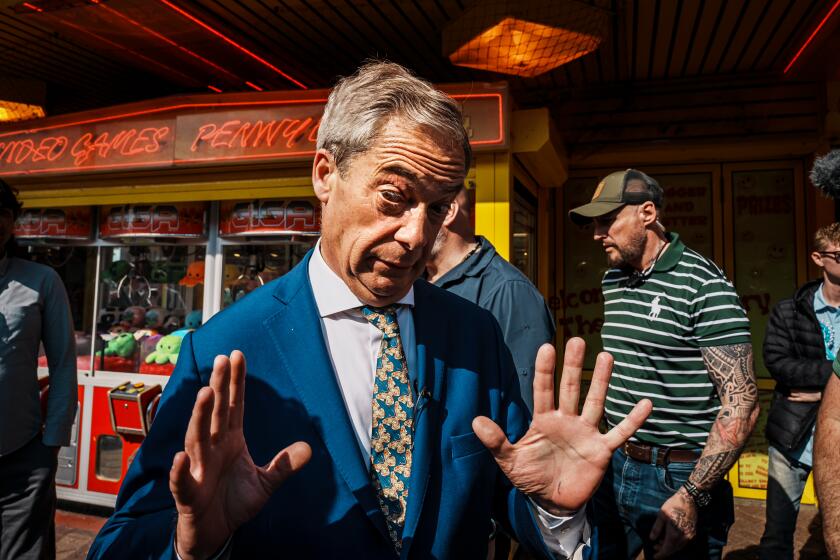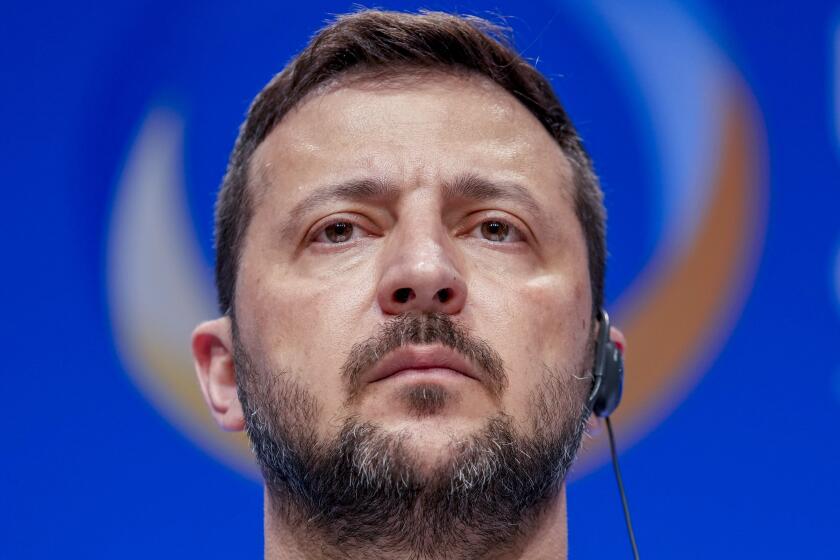
- Share via
PARIS — Covering an entire classroom wall in a Tunisian synagogue in Belleville, an immigrant haven on the slopes of northeastern Paris, are the names of 1,100 Jewish children who were arrested by French police, deported to Auschwitz and killed by the Nazis during World War II.
The war memorial goes street by street, family by family. The 53 children taken from homes a few blocks away on Rue de Belleville included Émile Rosenberg, 6, Éliane Apelojg, 5, Florence Endel, 4, and Michel Blumenkranc, 3.
“This shul was their home,” the memorial says.
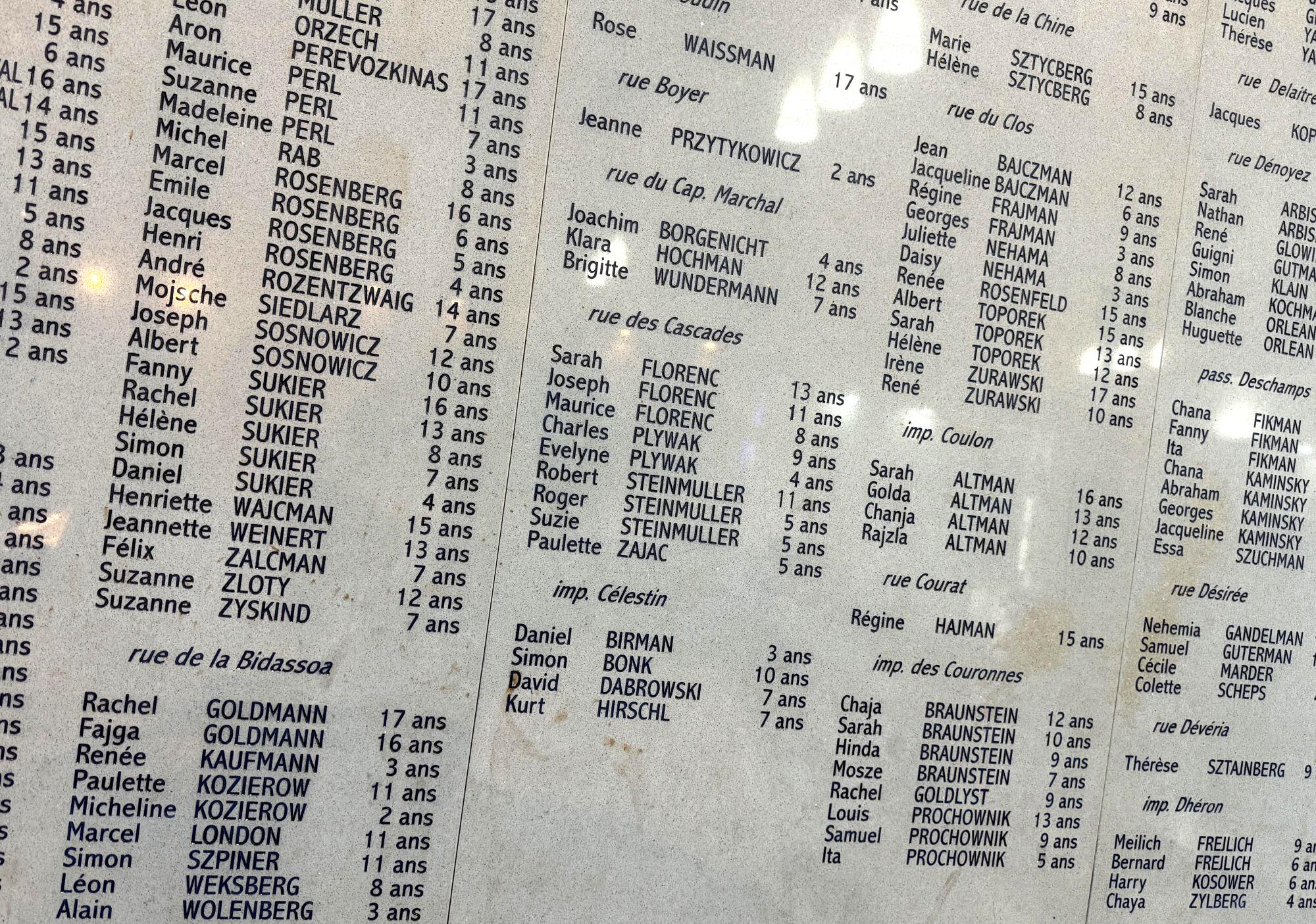
Despite this dark history, some Jews in Belleville are doing the once unthinkable and voting in France’s National Assembly election for the far-right National Rally party, which is leading in polls for Sunday’s runoff.
One of the party’s founders, Pierre Bousquet, was a French fighter in Hitler’s Waffen-SS. Another, Jean-Marie Le Pen, who led the party from its birth in 1972 until 2011, dismissed Nazi gas chambers as a “detail” of history.
France braces for potential political earthquake: a far-right surge. What to know about the election
French election: The far right seems poised to win biggest share of parliamentary seats; President Emmanuel Macron looks to have made a terrible political bet.
Jewish support for the party is a sign of how shaken many Jews have been by the record spike in antisemitic attacks in France since the Hamas-led assault on Israel on Oct. 7 that triggered Israel’s invasion of Gaza. Last month, police say, a 12-year-old Jewish girl was raped in a Paris suburb by three boys who tormented her with antisemitic insults.
It’s also a measure of how much the French left has enraged Jewish voters with its ferocious attacks on Israel and Zionism as it tries to build support among French Muslims, a substantially larger group of voters.
Over lunch with friends at Chez René et Gabin, a Tunisian kosher diner just down the hill from the synagogue, Judith Benchetrit said she’d voted for the National Rally in the first round — and asked whether anyone else had watched a harrowing TV documentary the night before about the Oct. 7 attack.
It was her deep loathing of the far-left France Unbowed movement and its leader, Jean-Luc Mélenchon, that led her to back the far right.
Mélenchon “campaigns on Palestine, so now he’s got all the Palestinians and every Arab in France behind him,” said Benchetrit, who is 32 and unemployed.
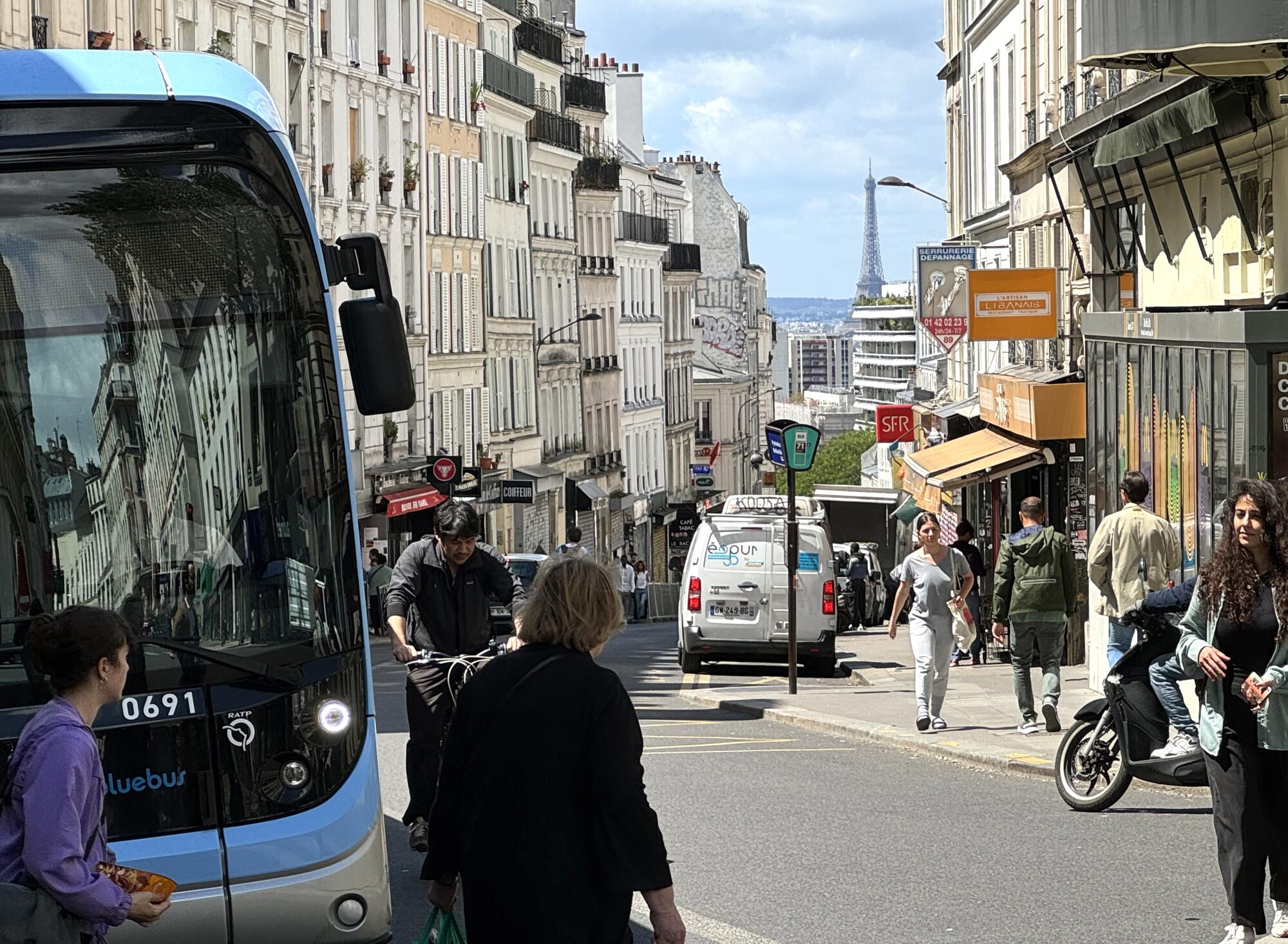
The National Rally has recast itself as an ally of Jews and Israel. If the party wins a majority in the assembly, its leader, Jordan Bardella, could become prime minister, putting France under the far right’s control for the first time since the fall of the Vichy regime that collaborated with the German occupation from 1940 to 1944.
Trump acolyte Nigel Farage, polarizing leader of a far-right party, is running for British Parliament. Could he lead a MAGA-like takeover of Conservatives?
A more likely result, polls suggest, is that the party will fall short of a majority, but win more seats than any other, destabilizing France as various factions fight for power.
Whatever the outcome, the snap election called by President Emmanuel Macron is sure to leave France with a parliament dominated by the far right and a far left that many Jews see as antisemitic.
Chalom Sayada, 60, a doctor who runs the synagogue’s youth programs, said that many members of the congregation were overlooking the National Rally’s lineage but that he wasn’t buying the rebranding by the party’s leaders.
“I’m not forgetting where they came from,” he said.
He called the election “a choice between the plague and cholera.”
: :
The synagogue, Rebbi Hai Taieb Lo Met, embodies Belleville’s rich history, a cycle of tragedy and renewal.
Founded in 1931 by the banker Edmond de Rothschild, it was built for the thousands of Ashkenazi Jews who settled in Belleville after fleeing persecution in Central and Eastern Europe. Belleville is just up the road from the Marais, the Jewish district of central Paris.
The Great Depression fomented widespread resentment of immigrants across France, leading to discrimination, detentions and expulsions.
During the German occupation, France’s collaborationist government in Vichy barred Jews from practicing many professions and mandated confiscation of their assets.
In July 1942, Belleville was one of the main targets of Paris police in the Vel d’Hiv Roundup. Citywide, they arrested nearly 13,000 Jews, including several thousand children, and deported them to Auschwitz, where almost all of them were killed.
With few survivors, the Hai Taieb synagogue was hollowed out. On another wall in the classroom, the names of hundreds of adults in the congregation who were arrested in the Vel d’Hiv raid and killed are etched into 10 stone tablets.
European Parliament elections yield victory for centrists, but in France, far-right landslide triggers snap parliamentary elections.
But the synagogue came back to life starting in the 1950s when thousands of Sephardic Jews from North Africa migrated to Belleville as Tunisia, Algeria and Morocco gained independence from France.
Muslims from the North African coast of the Mediterranean also migrated to Belleville. Their more recently arrived neighbors are Chinese, Vietnamese, Cambodian, Laotian and Senegalese.
On the Boulevard de Belleville, the Sabbah grocery store sells kosher and halal food, along with produits orientaux. Shoppers for pastries find makroudh sésame at Rose de Tunis and pains au chocolat at La Baguette des Pyrénées.
Tensions in the neighborhood sometimes rise, most recently between Muslims and Jews.
At the kosher diner, a third of the customers used to be Arab, said Stéphane Bsiri, the manager. The Arabs stopped coming after Oct. 7.
“They say our money is going to Israel,” Bsiri said with exasperation. “Idiots.”
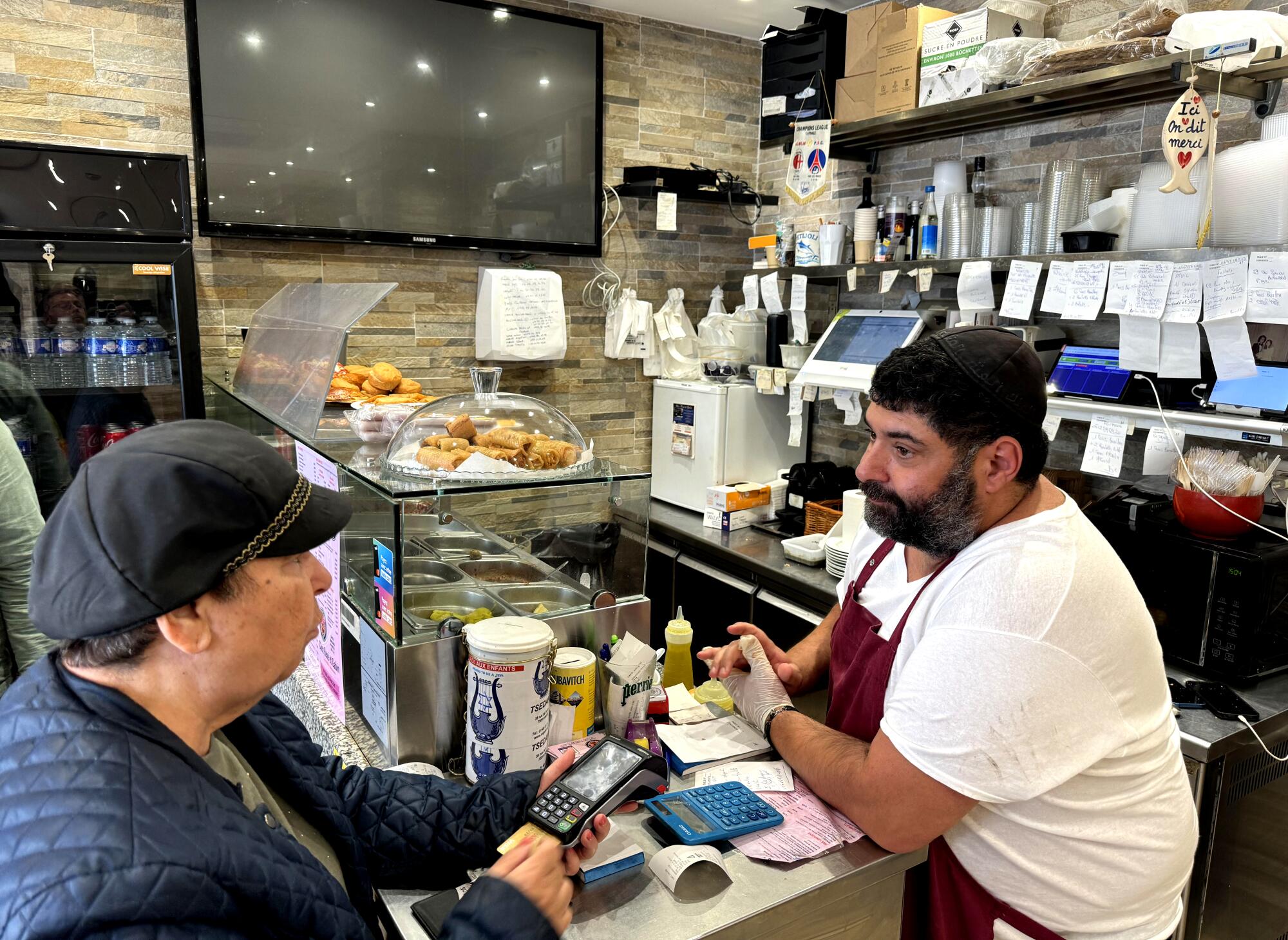
One of his customers, Sonia Lelloum, a daughter of Tunisian Jewish immigrants, said she’d resisted the temptation to vote for the National Rally in previous elections because of its Nazi ties. This time, she said, she went ahead and did it because she likes the party’s crusade against immigration.
“I’d like France to stay French,” said Lelloum, a private chef. “We’re the children of immigrants, but we integrated ourselves into France, we became French, and we respect France.”
Ukrainian President Zelensky is all over Europe, including at the G-7. His message? Ukraine’s war with Russia and Putin is Europe’s fight, too.
Down the street at Jojo, the kosher butcher shop his family has run for 64 years, Joseph Slama said he understands why the National Rally has attracted fellow Jewish voters, but thinks its past is disqualifying, especially when some French youth don’t know what the Holocaust was.
His grandfather, who migrated from Tunisia to Belleville in 1956, opened the butcher shop just outside the subway station by a busy street corner where young men now hawk black-market cartons of cigarettes for cash.
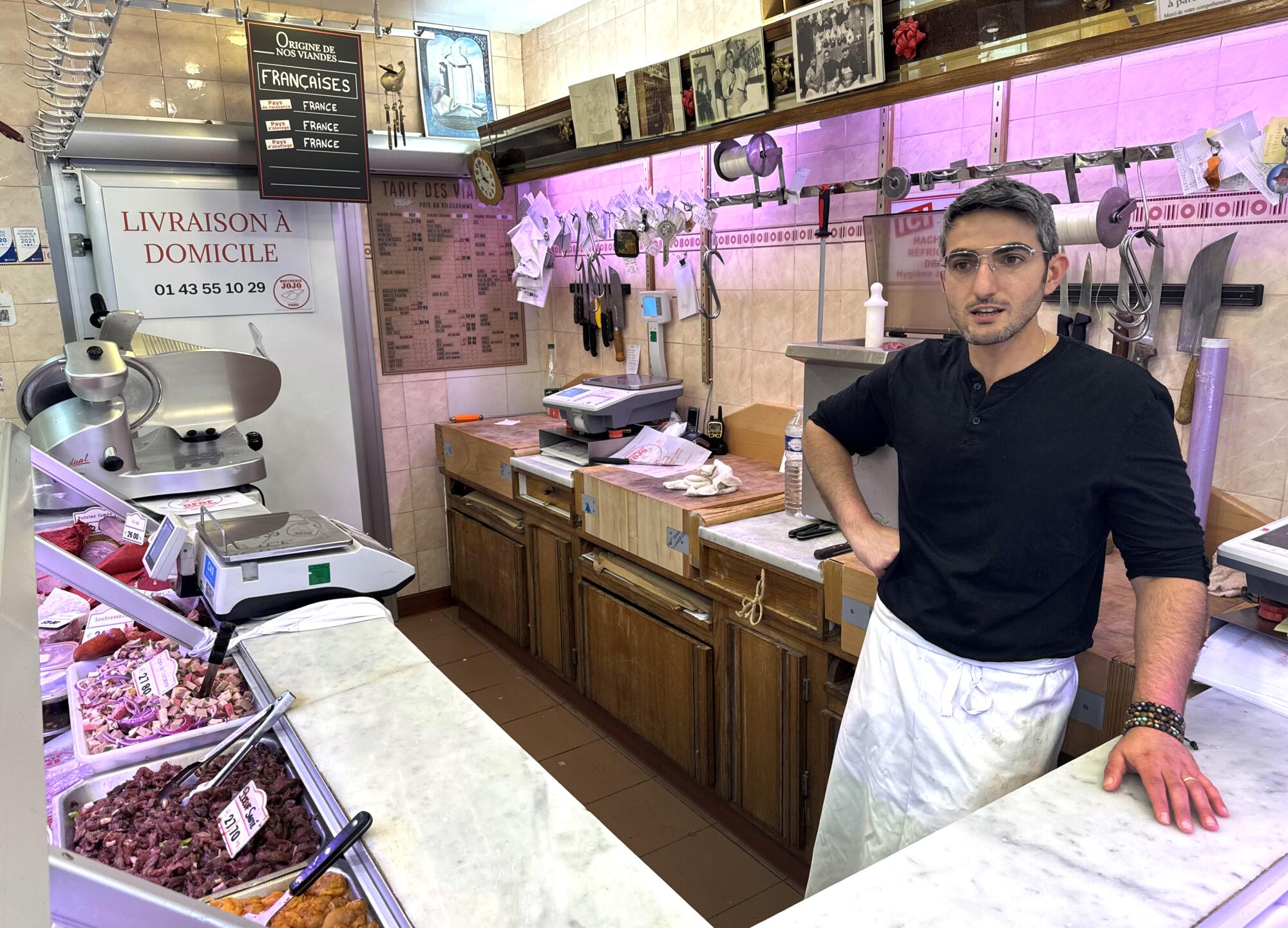
Slama, who favors centrists, sees the left led by Mélenchon as a threat to France’s estimated 400,000 Jews, the largest Jewish population outside the United States and Israel. Most worrisome to Slama, who has three children, is the constant confounding of Israel, Zionism and Jews.
“It puts us in danger in France,” he said after wrapping links of merguez for a customer. “I’m even afraid for my kids.”
: :
Antisemitic acts quadrupled in France last year, due to a surge after Oct. 7, according to a report last month by the government’s National Advisory Commission on Human Rights. The government has also reported a sharp rise in attacks on Muslims.
Alexandre Bande, a historian who has compiled a political history of antisemitism in France since 1967, said the left’s rhetoric on Gaza had clearly stirred fear among French Jews.
But he questioned the sincerity of the far right’s adoption of a friendly posture toward French Jews — most visibly with the appearance of Bardella and Marine Le Pen, a National Rally leader and daughter of the party co-founder, at a Paris march against antisemitism in November. Both Mélenchon and Macron skipped the protest.
“There’s no historical coherence,” Bande said, predicting that the far right will eventually “do what it’s always done, which is turn on the ‘bad French,’ and the ‘bad French’ could very well turn out once again to be Jews.”
While it makes sense for Jews to fear radical Islam, he said, “that doesn’t mean one should rush into the arms of another wolf.”
Ukrainians displaced by war find new purpose in Shakespeare’s play of love, loss and madness, bringing their blood-red version to the bard’s hometown.
For now, some Jews have removed mezuzahs from the doors of their homes and told their kids not to wear yarmulkes in the street.
On Rue Julien Lacroix in Belleville, not a single sign identifies Hai Taieb as a synagogue, and it takes a security code to enter the front door.
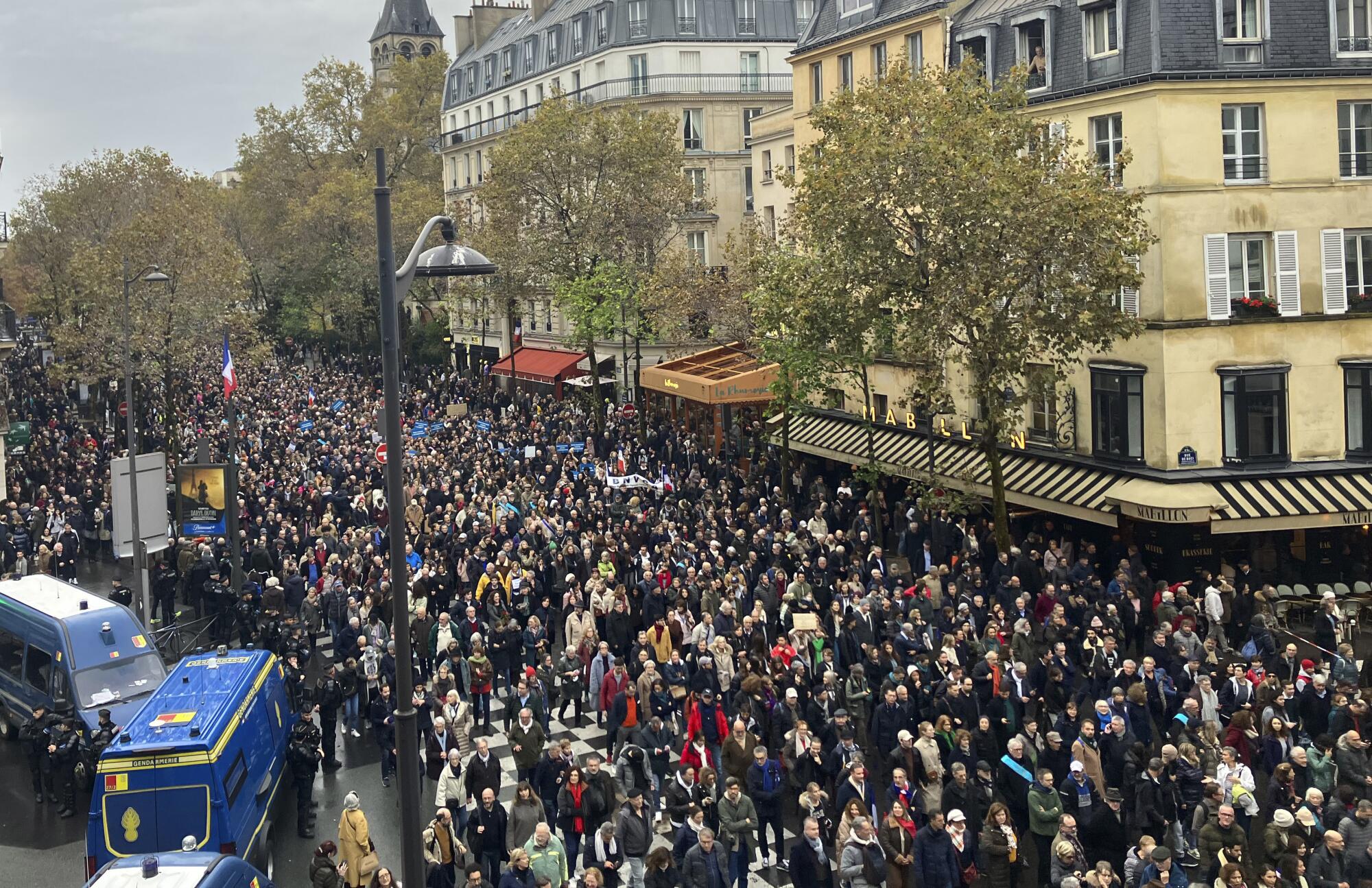
“It’s unmarked on purpose,” said Sayada, the doctor, whose father Gaston began worshiping there in 1956 after migrating from Tunisia and is now the synagogue’s president. “The Jew in France is discreet now. He has a duty to be discreet.”
That, he said, is the reason some congregants at the synagogue are supporting the National Rally.
“They want someone authoritarian to protect them,” he said.
One of the most stunning illustrations of the new opening to the far right came last month when the renowned Nazi hunter Serge Klarsfeld, 88, an icon to many Jews in France, told French television that if forced to choose between the National Rally and the country’s largest left-wing party, France Unbowed, he would pick the National Rally.
The synagogue’s memorial to the children credits Klarsfeld for documenting their names among the 74,150 Jews deported from France.
Finnegan is a special correspondent.
More to Read
Sign up for Essential California
The most important California stories and recommendations in your inbox every morning.
You may occasionally receive promotional content from the Los Angeles Times.

